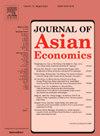Constraints and incentives: Promoting air pollution governance through performance evaluation system
IF 3.4
3区 经济学
Q1 ECONOMICS
引用次数: 0
Abstract
This paper examines the impact of simultaneously strengthening environmental data authenticity constraints and targeted environmental incentives in officials’ performance evaluation system on local air pollution governance. To do so, we construct a simple theoretical model to illustrate the behaviors of local governments under strengthened environmental constraints and incentives in the context of China’s new air quality standards (NAQS). We then evaluate the effectiveness of NAQS using the 2008–2016 Chinese city-level panel data and the staggered difference-in-differences (DID) method. We find that the implementation of NAQS resulted in an average decrease of 1.50 % in PM2.5 concentration in pilot cities, and exhibits heterogeneity under different levels of environmental decentralization, local environmental protection tendencies, and officials’ promotion incentives. Mechanism analysis suggests that this effect may be achieved by increasing the share of local government environmental expenditures and promoting industrial greening. Cost-benefit analysis shows that the Chinese government is willing to pay a premium for immediate pollution reductions. We also further discuss the impacts of NAQS on other air pollutants and carbon emissions. Our findings provide empirical evidence for simultaneously strengthening constraints and incentives related to environmental protection in officials’ evaluation system to promote pollution control. This provides a valuable reference for developing countries to consider similar policies.
约束与激励:通过绩效评价体系推进大气污染治理
本文考察了在官员绩效考核体系中同时强化环境数据真实性约束和针对性环境激励对地方大气污染治理的影响。为此,我们构建了一个简单的理论模型来说明在中国新空气质量标准(NAQS)背景下加强环境约束和激励下地方政府的行为。然后,我们使用2008-2016年中国城市层面的面板数据和交错差中差(DID)方法来评估NAQS的有效性。研究发现,实施NAQS后,试点城市PM2.5浓度平均下降1.50 %,且在不同的环境分权程度、地方环保倾向和官员晋升激励下呈现异质性。机制分析表明,提高地方政府环境支出比重和促进产业绿化可以实现这一效应。成本效益分析表明,中国政府愿意为立即减少污染支付额外费用。我们还进一步讨论了NAQS对其他空气污染物和碳排放的影响。本文的研究结果为在官员评价体系中同时强化与环境保护相关的约束和激励以促进污染治理提供了实证证据。这为发展中国家考虑类似政策提供了宝贵参考。
本文章由计算机程序翻译,如有差异,请以英文原文为准。
求助全文
约1分钟内获得全文
求助全文
来源期刊

Journal of Asian Economics
ECONOMICS-
CiteScore
4.70
自引率
9.40%
发文量
90
期刊介绍:
The Journal of Asian Economics provides a forum for publication of increasingly growing research in Asian economic studies and a unique forum for continental Asian economic studies with focus on (i) special studies in adaptive innovation paradigms in Asian economic regimes, (ii) studies relative to unique dimensions of Asian economic development paradigm, as they are investigated by researchers, (iii) comparative studies of development paradigms in other developing continents, Latin America and Africa, (iv) the emerging new pattern of comparative advantages between Asian countries and the United States and North America.
 求助内容:
求助内容: 应助结果提醒方式:
应助结果提醒方式:


